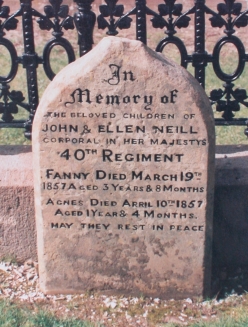John Neill
Contents
Background
Goldfields Involvement, 1854
Neill was a Private in the 40th Regiment (Reg. No 2557), who was a participant in the Eureka Stockade battle. Two of his children are buried in the Soldiers grave at the Ballaarat Old Cemetery. He wrote a letter on 7 February 1870 which gives his version of the battle.[1]
Reminiscence
- THE MILITARY POINT OF VIEW
- A long letter, dated February 7, 1870, and signed "John Neill, late of the 40th Regiment," describing the attack on the Stockade, and some of the immediately subsequent events gives the point of view of a soldier who took part in them.
- "As a military man," he writes, "and one who took a most prominent part in all the military movements of that day, I beg leave to offer a remark upon the statement made by the Government officer of the camp. The small force consisted of detachments of the 12th and 40th Regiments, and a few troopers and foot police, the whole under the command of Captains Thomas and Wise, and a lieutenant of the 12th — I forget his name. The order to fall in and be silent was given, and when Captain Thomas had spoken a few words we were put in motion, led by Captain Wise. The party had not advanced three hundred yards before we were seen by the rebel sentry, who fired, not at our party, but to warn his party in the Stockade. He was on Black Hill. Captain Thomas turned his head in the direction of the shot and said:—
- "We are seen. Forward, and steady, men! Don't fire; let the insurgents fire first. You wait for the sound of the bugle.'
- "When within a short distance of the Stockade the insurgents fired. Captain Wise fell, mortally wounded. The same volley wounded the lieutenant of the. 12th. already spoken of, and three of his men; two killed, one wounded of the 40th—Pri vates Michael Roony, Joseph Wall, killed; William Juniper, badly wounded The camp officer says the police were the first to enter the Stockade. He is wrong. There was not one policeman killed or wounded during the whole affair. When Captain Wise fell the men cheered, and were over in the Stockade in a second, and then bayonet and pike went to work. The diggers fought well and fierce, not a word spoke on either side until all was over. The blacksmith who made the pikes was killed by Lieut. Richards, 40th Regiment. Honor to his name; he fought well and died gloriously. It was rumored that at that time the police were cruel to the wounded and prisoners. No such thing. The police did nothing but their duty, and they did it well for men who were not accustomed to scenes of blood or violence- To my knowledge there was only one wounded man despatched, and he kept swinging his pike about his head as he sat on the ground. His two legs were broken, and he had a musket ball in his bcdy. He could not live, and it was best to despatch him. His name was O'Neill, a native of Kilkenny, Ireland. I heard this statement from a sergeant of police, and I knew it was correct."[2]
Post 1854 Experiences
See also
Further Reading
Corfield, J.,Wickham, D., & Gervasoni, C. The Eureka Encyclopaedia, Ballarat Heritage Services, 2004.
